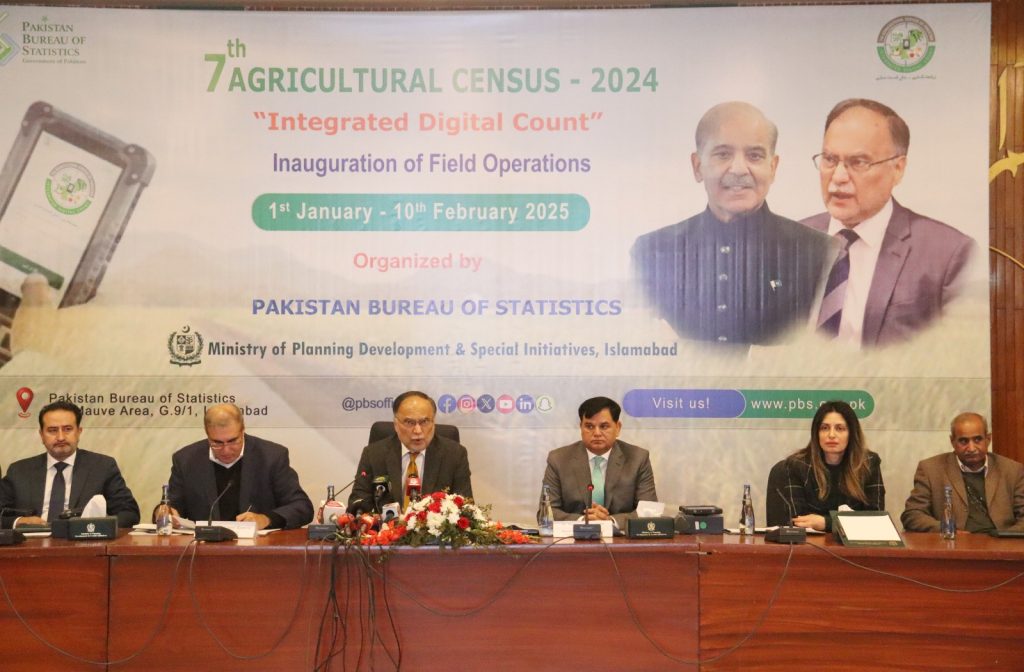The Minister for Planning, Development, and Special Initiatives, Prof. Ahsan Iqbal, inaugurated the field operations for Pakistan’s 7th Agricultural Census today. The census, titled “The Integrated Digital Count,” was organized by the Pakistan Bureau of Statistics (PBS). The launch event took place in the Auditorium of the Ministry of Planning, Development, and Special Initiatives. During the event, the Minister also unveiled a new digital dashboard for real-time monitoring of census progress and data analysis.
This initiative underscores the government’s commitment to addressing economic challenges and aligning Pakistan’s agricultural sector with international practices. It aims to ensure sustainable development, enhance food security, and boost agricultural productivity.
Muhammad Sarwar Gondal (Sitara-i-Imtiaz), Member (SS/RM) and Focal Person for the Agricultural Census, welcomed Prof. Ahsan Iqbal and other attendees. In his address, he emphasized PBS’s dedication to delivering timely and accurate data for strengthening the agricultural sector. He highlighted that this long-overdue activity is aligned with the government’s vision of a “Green Pakistan Sustainable Future.”
PBS, which operates 34 regional and 125 district offices nationwide, has been pivotal in executing large-scale projects. Notably, it conducted South Asia’s largest digital census—the 7th Population and Housing Census 2023—covering 250 million people and geo-tagging 40 million structures.
Mr. Gondal stressed the critical role agriculture plays in Pakistan’s economy, contributing 24% to the GDP. Livestock remains a key driver within this sector. He also highlighted PBS’s use of GIS technology and modern digital tools for enhanced data quality in the census. This approach adheres to standards set by the United Nations Food and Agriculture Organization (UNFAO).
The census covers agriculture, livestock, and machinery sectors across Pakistan, including Gilgit-Baltistan and Azad Jammu & Kashmir. Despite previous delays, PBS’s integrated digital methodology marks a significant advancement. Mr. Gondal expressed gratitude to the Agriculture Extension, Crop Reporting Service, Livestock and Dairy Development Department, and the Revenue Department for their support.
To ensure smooth operations, PBS has trained 7,686 enumerators and supervisors. From January 1 to February 10, 2025, they will collect vital data digitally. The information will inform policies addressing food insecurity and agricultural resilience. This collaborative effort involves federal and provincial governments, academia, and various stakeholders, aiming for evidence-based decision-making to strengthen agriculture nationwide.
Prof. Ahsan Iqbal officially launched the field operations and the GIS Monitoring Dashboards at the event. He also distributed tablets to enumerators, showcasing the importance of digital tools in improving data accuracy.
In his speech, Prof. Iqbal highlighted agriculture as the backbone of Pakistan’s economy. He emphasized the agricultural census’s role in empowering farmers and driving sustainable development. He noted that the collected data will guide policies addressing resource management, crop patterns, and food security.
The Minister stressed the need for consistent policies to ensure long-term development and warned against the risks of political instability. He called the 7th Agricultural Census a historic step toward data-driven policymaking and economic reforms. He praised the use of centralized GIS technology for real-time monitoring and effective resource allocation.
Prof. Iqbal assured that the federal government is committed to working with provincial governments and stakeholders to uplift farmers’ livelihoods. He concluded by underlining the importance of this census in shaping policies that will strengthen food security, empower farmers, and boost the agricultural sector.
This collaborative initiative, which involves multiple levels of government and industry, marks a major step forward for Pakistan’s agricultural sector and its farmers. Field operations for the census, “The Integrated Digital Count,” have officially commenced in all provincial capitals.


